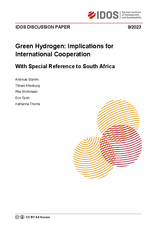Discussion Paper
Green hydrogen: implications for international cooperation: with special reference to South Africa
Stamm, Andreas / Tilman Altenburg / Rita Strohmaier / Ece Oyan / Katharina ThomsDiscussion Paper (9/2023)
Bonn: German Institute of Development and Sustainability (IDOS)
ISBN: 978-3-96021-210-2
DOI: https://doi.org/10.23661/idp9.2023
Preis: 6 €
Green hydrogen – produced with renewable energy – is indispensable for the decarbonisation of economies, especially concerning “hard-to-abate” activities such as the production of steel, cement and fertilisers as well as maritime transport and aviation. The demand for green hydrogen is therefore booming. Currently, green hydrogen is far more expensive than fossil fuel-based alternatives, but major initiatives are underway to develop a global green hydrogen market and bring costs down. Green hydrogen is expected to become cost-competitive in the mid-2030s.
Given their endowment with solar and wind energy, many countries in the Global South are well-positioned to produce low-cost green hydrogen and are therefore attracting investments. Whether and to what extent these investments will create value and employment for – and improve environmental conditions in – the host economies depends on policies. This discussion paper analyses the potential industrial development spillovers of green hydrogen production, distinguishing seven clusters of upstream and downstream industries that might receive a stimulus from green hydrogen. Yet, it also underlines that there is no automatism. Unless accompanied by industrial and innovation policies, and unless there are explicit provisions for using revenues for a Just Transition, hydrogen investments may lead to the formation of socially exclusive enclaves.
The paper consists of two parts. Part A provides basic information on the emerging green hydrogen market and its technological ramifications, the opportunities for countries with abundant resources for renewable energy, how national policies can maximise the effects in terms of sustainable national development and how this can be supported by international cooperation. Part B delves into the specific case of South Africa, which is one of the countries that has an advanced hydrogen roadmap and hosts several German and international development projects. The country case shows how a national hydrogen strategy can be tailored to specific country conditions and how international cooperation can support its design and implementation.
Kontakt
Cornelia Hornschild
Koordinatorin Publikationen
E-Mail Cornelia.Hornschild@idos-research.de
Telefon +49 (0)228 94927-135
Fax +49 (0)228 94927-130
Alexandra Fante
Bibliothekarin/Open Access-Koordinatorin
E-Mail Alexandra.Fante@idos-research.de
Telefon +49 (0)228 94927-321
Fax +49 (0)228 94927-130








